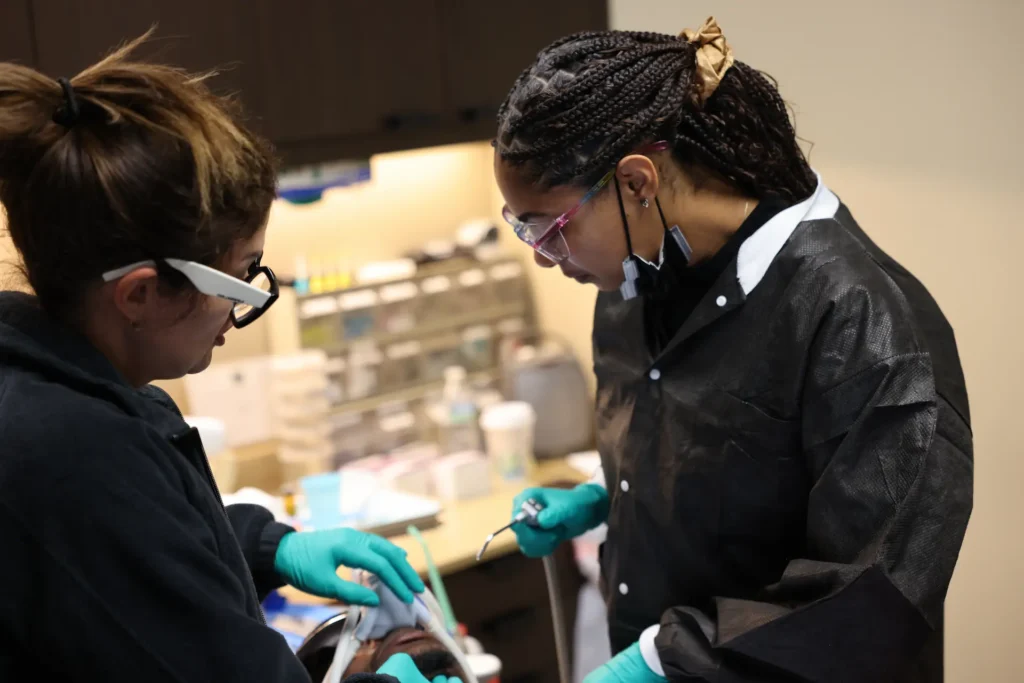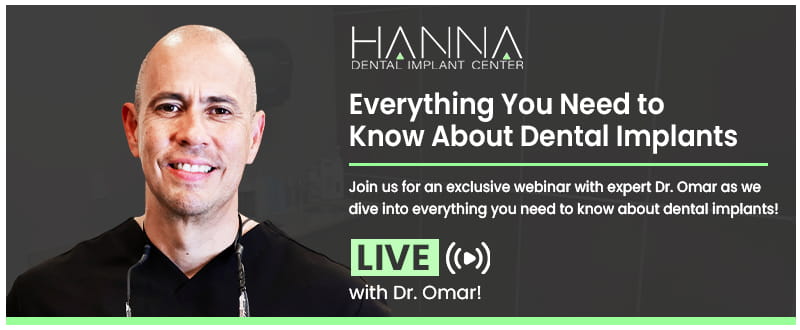If you’re thinking about getting dental implants but feel unsure because of a metal allergy, you’re not alone. It’s a common concern, especially for people who’ve had reactions to metals like nickel in the past.
While some people may be afraid of a titanium allergy and dental implants, a titanium allergy is rare whereas a metal allergy is more common. Those with an allergy to metal are typically unaffected by titanium.
It’s so well tolerated that more than 95% of dental implants placed worldwide are made from titanium. Plus, titanium allergies are extremely rare. In fact, studies show that only 0.6% of people may have any type of sensitivity to titanium. That means the vast majority of patients can safely receive titanium implants without any issues.
Still, your comfort and safety come first. At Hanna Dental Implant Center, our double board-certified experts are here to make sure you get the best care. If there’s any concern about sensitivity, we offer zirconia implants, a strong, metal-free option for people who may prefer an alternative.
Let’s walk you through what titanium is, why it’s used in dental implants, and what to do if you’re worried about a reaction.
Key Takeaways
- Titanium dental implants are generally considered safe, with allergic reactions being very rare.
- At Hanna Dental Implant Center, our experienced team of double board-certified experts provides zirconia implants for patients with metal sensitivities, offering a safe alternative to titanium.
- Most people with metal allergies can safely receive titanium implants, as titanium is biocompatible and used in many medical devices.
- If sensitivity to titanium were to occur, it would typically manifest early in the recovery process and can be addressed by a healthcare provider.
- The success rate of titanium implants is very high, with complications being rare, and regular check-ups ensure any potential issues are caught early.
What is Titanium and Why Is It Used in Dental Implants?
Titanium is a strong, lightweight metal that’s been used in medicine for decades. It’s known for being biocompatible, which means it works well with the human body. That’s why doctors use it in everything from joint replacements to pacemakers.
In dental implants, titanium plays a big role in long-term success as it fuses naturally with the jawbone through a process called osseointegration. This bond helps the implant stay firmly in place, acting like the root of a real tooth. It also supports the surrounding bone and keeps your facial structure intact.
Titanium is also highly durable. It resists corrosion, doesn’t break down over time, and can last long-term with proper care. Its long track record in both medical and dental procedures shows just how safe and effective it really is. For most patients, titanium remains the gold standard for dental implants.
Can You Be Allergic to Titanium Dental Implants?
It’s natural to worry about allergies, especially when it comes to something that’s going into your body. The good news is that titanium is known for being hypoallergenic. That means it rarely causes allergic reactions, even in people who are sensitive to other metals.
That said, no material is completely risk-free. In very rare cases, a person might react to titanium. Signs of a possible allergy can include swelling, itchiness, or irritation around the implant site.
Is Titanium Safe for People with Metal Allergies?

Yes, titanium is generally safe, even for people who have allergies to other metals like nickel. That’s because titanium doesn’t contain the same compounds that usually trigger allergic reactions. It’s often the go-to material for people with metal sensitivities because of how rarely it causes problems.
Many patients with a history of metal allergies have received titanium implants without any issues. This is one reason why titanium is used in so many other medical devices, including joint replacements and heart valves.
Still, if you’ve had strong reactions to metal in the past, it’s a good idea to talk to our experienced dental Implant specialist. We take extra care to evaluate your medical history and make sure you’re getting a solution that works for you.
How Do You Know if Your Body Is Rejecting a Titanium Implant?
Dental implant rejection is extremely rare, and while most people heal without any problems it’s helpful to know what signs to look out for.
Here are a few symptoms that might suggest your body isn’t adjusting well to the implant:
- Ongoing and persistent pain or discomfort near the implant site.
- Swelling that doesn’t go down.
- Prolonged and worsening redness or warmth around the area.
- Gum irritation or bleeding.
- Loosening of the implant.
But remember- these symptoms don’t always mean rejection. They could also point to infection, poor healing, or issues with how the implant was placed. That’s why follow-up visits are so important. At Hanna Dental Implant Center, we monitor your healing closely and act quickly if anything feels off. With the right attention and support, most concerns can be resolved without removing the implant.
What to Do if You Think You’re Having a Reaction to Your Titanium Implant
If something doesn’t feel right after getting a dental implant, don’t wait it out. The first step is to contact your dental specialist right away. They’ll examine the area, ask about your symptoms, and may run a few tests to check for signs of infection or sensitivity.
In rare cases where an allergic reaction to titanium is suspected, your dentist may recommend a patch test to see if you have a titanium allergy. This helps confirm what’s causing the issue and guides the next steps in your treatment.
If you’re sensitive to titanium, don’t worry—there are other options, like zirconia implants or ceramic implants. These are strong, safe, and completely metal-free, making them a great alternative for patients with known metal sensitivities.
Let Us Help You Pick the Right Implant For You!
Titanium dental implants are trusted by dental specialists worldwide because they’re safe, strong, and rarely cause problems, even for people with metal sensitivities. But if you’ve ever had a reaction to metal or just want to explore your options, it’s okay to ask questions and get clarity.
At Hanna Dental Implant Center, we take your concerns seriously. Our team is experienced in working with all kinds of patients, including those who may need a more customized approach. If titanium isn’t the right fit for you, we offer zirconia implants, a reliable metal-free option that can restore your smile without worry.
You don’t have to figure it out on your own. Book a consultation with us today, and let’s find the solution that works best for you.
Frequently Asked Questions
Can you be allergic to titanium dental implants?
Allergies to titanium dental implants are extremely rare. Titanium is hypoallergenic and widely used in medical and dental treatments. If you’re concerned, your dental specialist can run tests to check for sensitivity before treatment.
Is titanium safe for dental implants?
Titanium is one of the safest and most trusted materials for dental implants. It fuses well with bone and is highly durable, making it ideal for long-term use.
Is sensitivity to titanium a cause of implant failure?
Most implant failures are linked to issues like poor healing, infection, or bone loss—not titanium sensitivity. Still, if a patient has a reaction, alternatives like zirconia implants are available.
Is titanium safe for people with metal allergies?
In most cases, yes. Titanium doesn’t contain the same compounds that trigger reactions in metals like nickel. Many people with metal allergies tolerate titanium just fine.
How do you know if your body is rejecting a titanium implant?
Signs might include ongoing pain, swelling, gum irritation, or loosening of the implant. Rejection is rare, and most issues can be treated if caught early. Regular follow-ups help prevent serious problems.
How do I know if I’m allergic to my implants?
If you experience itching, burning, or unexplained discomfort near the implant, let your dentist know right away. A sensitivity test can help confirm if it’s a titanium allergy, and your care team can guide you on the next steps.



